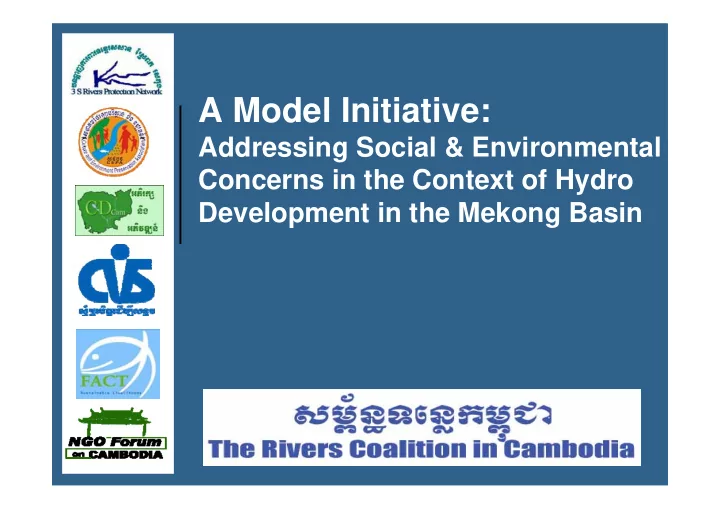

A Model Initiative: Addressing Social & Environmental Concerns in the Context of Hydro Development in the Mekong Basin
The Lifeblood of Cambodia 30% of Cambodia’s Population lives below poverty line, 72% of these rely on the natural resources for their survival The Tonle Sap Lake and the Mekong River and its tributaries is the lifeblood of Cambodia The Tonle Sap Lake produces 100,000 tons of fish a year, providing 80 percent of the protein consumed within the country Fish migrate from the Tonle Sap Lake into the Mekong River help restock fisheries as far upstream as Yunnan province in China
Experiences with Mekong Basin Hydro Development •Transboundary Impacts of Vietnam’s Dams •1995 Mekong Agreement Not fully being Enforced •Inadequate/or No EIAs •Limited/or No Public Participation •Unresolved Environmental and Social Impacts
Transboundary Dams Sesan River 3 dams operational and 3 under construction Srepok River 1 dam operational and 4 under construction Sekong River 1 dam operational and 1 under construction
Impacts to Ecological Systems •Erratic and Irregular Water Flows (Floods, Dry Ups, and irregular) •Deteriorating Water Quality •Riverbank Erosion •Loss of Fishery Habitat, Aquatic Life, and Riparian Species • Reduction in Fish Catches and Fish Species
Impacts to Society ● Loss of Livelihood and Decrease in Household Income from $109 to $46 a month ● 76% Fish Decline = Loss of Food Security ● Increase in Water-borne Illness and Deaths ● 722 Households Have Abandoned Homes ● Disruption to Cultural Activities ● Fear of River
Threats of Mekong Gonguoqiao Xiaowan Manwan Dachaoshan CHINA Development Nuozhadu Jinghong Ganlanba Mengsong VIETNAM BURMA Nam Ou 1-7 Nam Tha 1 HANOI LP LAOS PB Nam Ngum 5 Nam Ngiep 1 SA Nam Ngum 3 Nam Ngum 2 m a k Proposed dams on Lower u N e L PL Nam Theun 1 Mekong mainstream Nam Theun Hinboun Nam Ngum Nam Mang 3 Theun Hinboun (extension) PB Pak Beng Nam Theun 2 PC VIENTIANE LP Luang Prabang SA Sayaburi Xe Bang Fai PL Pak Lay THAILAND Xekong 5 PM PaK Chom Xe Bang Hieng Xe Set 2 Xekong 4 BK Ban Kum BK Xekaman 3 Xe Set 1 DS Don Sahong Xekaman 1 Houay Ho SB Sambor Xe Pian-Xe Nam Noy Nam Kong 1 Yali Fall Sesan 3 2 n a Sesan 3A s e BANGKOK S Sesan 4 Lower r e w Srepok 2 DS o L CAMBODIA Lower Srepok 3 Srepok 4 SB Lower Srepok 4 Srepok 3 Dray Linh New Dray Linh Old TERRA Buon Koup PHNOM PENH Ban Tou Srah
MRC Involvement on Sesan Year Activity 2000 � MRC Secretariat Delegate Visits Sesan � MRC Facilitates Dialogue between Vietnam and Cambodia � Joint Committee on the Sesan River Established between Vietnam and Cambodia � First Bilateral Meeting Held 2001 2002 � Vietnam’s Ministry of Industry Acknowledges Harm from 2000 Water Releases 2003 � Five Solutions Established Establishing Notification System � MRC Facilitates Water Quality Study on Sesan [No health parameters 2004-2005 were tested] � EIA for Sesan Dams Completed [MRC Not Directly Involved, but CNMC 2007 and VNMC] � Fourth Bilateral Meeting Held [No Solutions Made] 2008
Community and Civil Society’s Experience with 3S Dams � Limited or No Public Participation in Planning and Decision Making Processes � Project Planning and Studies are Not Transparent � Community and Civil Society Must Document Impacts � Complaints Ignored � No Compensation or Mitigation � No Dispute Mechanism in Place
Conclusions from the 3S Experience 1) There Are No Model Initiatives to Address Social and Environmental Concerns In Place 2) The Concept of Sustainable Hydropower Development on the Mekong Must be Questioned
A Role for the MRC’s Hydropower Programme 1) Facilitate Research and Dialogue 2) Promote Regional Water Governance 3) Capacity Building
1. Facilitate Research and Dialogue •Generate Scientific Transboundary Data About the State of the River and its Major Tributaries (Including Environmental and Social Impacts of Dam) •Facilitate Studies with Research Institutions, Scientists, Government Agencies and Civil Society •Disclose Research to Public •Hold Transboundary Dialogue and Debate
2. Promote Regional Water Governance • Enforce the 1995 Mekong Agreement and Make Necessary Amendments • Enable Member States to Promote and Respect Community Rights • The MRC Must Define and Declare the International Standards that the MRC Agrees to Uphold related to hydropower • Help Resolve Transboundary Disputes
3. Capacity Building Capacity Building of Member States to Adhere To Best Practice Standards & To Adequately Prevent and Mitigate Impacts, including: - Training on Transboundary EIAs - Public Participation Tools - Developing Public Disclose Standards - Dam Operation and Environmental Flows - Conflict Resolution
Thank you for your attention For more information, please contact: The Rivers Coalition in Cambodia ngoforum@ngoforum.org.kh
Recommend
More recommend